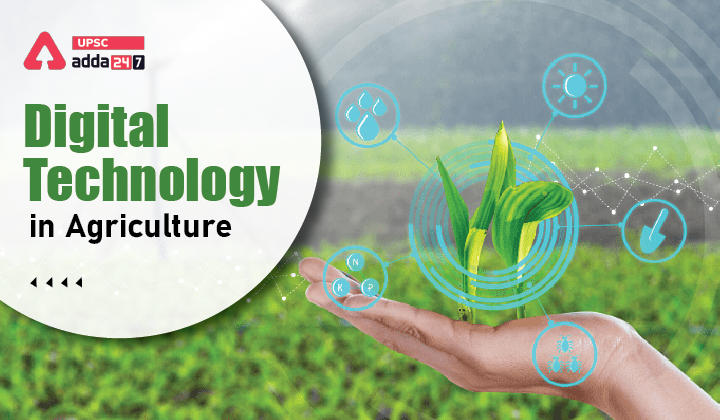Table of Contents
Digital Technology in Agriculture- Relevance for UPSC Exam
- GS Paper 3: Indian Agriculture– e-technology in the aid of farmers.
Digital Technology in Agriculture in News
- Recently, the Union Minister of Agriculture and Farmers Welfare, Shri Narendra Singh Tomar in Lok Sabha informed about various initiatives to give a push to digital agriculture in the country.
- Digital technologies are finding increasing use in the agricultural value system, and farmers are increasingly becoming more informed, as various measures are taken to provide them ready access to technology and information.
- Few important of the digital initiatives are mentioned below-
11th Agriculture Census Launched
India Digital Ecosystem of Agriculture (IDEA) Framework
- India Digital Ecosystem of Agriculture (IDEA) would lay down the architecture for the federated farmers’ database.
- Further, the databases related to the schemes governed by the Department have been integrated.
- The IDEA would serve as a foundation to build innovative agri-focused solutions leveraging emerging technologies to contribute effectively in creating a better Ecosystem for Agriculture in India.
- This Ecosystem shall help the Government in effective planning towards increasing the income of farmers in particular and improving the efficiency of the Agriculture sector as a whole.
National e-Governance Plan in Agriculture (NeGP-A)
- Under the Plan scheme, funds are released to the State(s)/UT(s) for project involving use of modern technologies viz.-
- Artificial Intelligence (AI),
- Machine Learning (ML),
- Robotics,
- Drones,
- Data Analytics,
- Block Chain etc.
Sub Mission on Agricultural Mechanization (SMAM)
- Sub Mission on Agricultural Mechanization (SMAM) is being implemented w.e.f April,2014.
- The SMAM scheme aims at ‘reaching the unreached’ by-
- bringing to the small and marginal farmers in the core and giving the benefits of farm mechanization,
- Promoting ‘Custom Hiring Centers’ ,
- Creating hubs for hi-tech & high value farm equipments,
- Distribution of various agricultural equipments,
- Creating awareness among stakeholders through demonstration and capacity building activities, and
- Ensuring performance- testing and certification at designated testing centers located all over the country.
National Agriculture Market (e-NAM)
- E-NAM is a pan-India electronic trading portal which networks the existing Agricultural Produce Market Committee (APMC) mandis to create a unified national market for agricultural commodities.
- Digital services are provided to traders, farmers, Farmers Producer Organizations (FPO), Mandis through various modules of e-NAM platform such as FPO trading module, warehouse based trading module.
PM KISAN Scheme
- PM KISAN Scheme, fund is directly transferred into the bank accounts of the eligible farmers under Direct Benefit Transfer mode.
- Farmers can do their self-registration through the Farmers Corner in the portal.
- PM-KISAN Mobile App was launched to broaden the reach of the scheme where farmers can-
- View the status of their application,
- Update or carry out corrections of name based on their Aadhaar card and
- Also check history of credits to their bank accounts.
12th BRICS Agriculture Ministers Meeting 2022
Integrated Scheme for Agricultural Marketing schemes (AGMARKNET)
- AGMARKNET aims to promote creation of agricultural marketing infrastructure by providing backend subsidy support to State, cooperative and private sector investments Services are provided through (AGMARKNET) portal.
- AGMARKNET portal is a G2C e-governance portal that caters to the needs of various stakeholders such as farmers, industry, policy makers and academic institutions by providing agricultural marketing related information from a single window.
- It facilitates web- based information flow, of the daily arrivals and prices of commodities in the agricultural produce markets spread across the country.
Climate Resilient Agriculture: APEDA signs MoU with NRDC
Agriculture Infrastructure Fund (AIF)
- To mobilize a medium – long term debt finances facility for investment in viable projects for post-harvest management Infrastructure and community farming assets through incentives and financial support in order to improve agriculture infrastructure in the country.
- Financial assistance is provided digitally in the form of Interest Subvention and Credit Guarantee for setting up post-harvest management Infrastructure to beneficiaries such as-
- Farmers,
- Primary Agricultural Credit Societies (PACS),
- Farmer Producers Organisations (FPOs),
- Self Help Groups (SHG),
- State Agencies/APMCs.
National Mission on Horticulture- HORTNET project
- It Promotes holistic development of Horticulture sector (including bamboo & coconut)
- HORTNET project is a web enabled work flow-based system for providing financial assistance under MIDH.
- It is a unique intervention to accomplish e-Governance in NHM where-in total transparency has been envisaged in all the processes of workflow i.e.-
- Online application filing,
- Authentication,
- Processing and
- Online payment to the beneficiary’s bank account through DBT.
National Project on Soil Health and Fertility- Soil Health Card Portal
- To issue soil health cards to farmers of the country, so as to provide a basis to address nutrient deficiencies in fertilization practices.
- Soil Health Card Portal is available where farmers can track soil samples.
Development of Kisan Suvidha mobile application
- To facilitate dissemination of information to farmers on the critical parameters viz.,
- Weather;
- Market Prices;
- Plant Protection;
- Input Dealers (Seed, Pesticide, Fertilizer) Farm Machinery;
- Soil Health Card;
- Cold Storages & Godowns, Veterinary Centres and Diagnostic Labs.
- With market information, farmers are better informed about markets to sell produce, prevailing market prices and quantity demanded in the market.
- Thus, they can make informed decisions to sell produce at the right price and right time.
Technology in Agriculture: Remote Sensing Crop Model




 TSPSC Group 1 Question Paper 2024, Downl...
TSPSC Group 1 Question Paper 2024, Downl...
 TSPSC Group 1 Answer key 2024 Out, Downl...
TSPSC Group 1 Answer key 2024 Out, Downl...
 UPSC Prelims 2024 Question Paper, Downlo...
UPSC Prelims 2024 Question Paper, Downlo...
